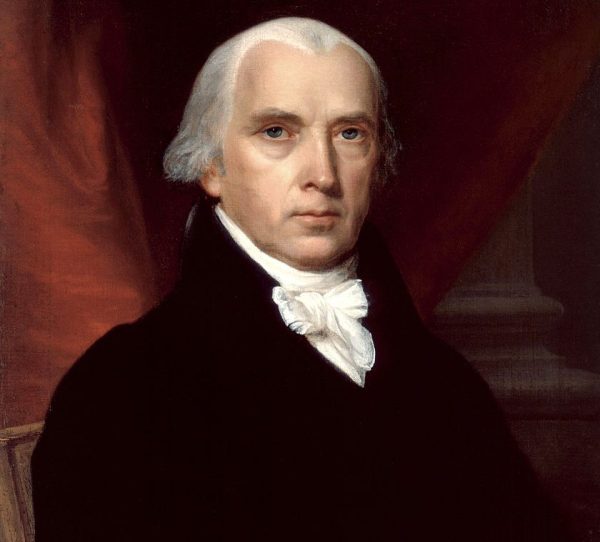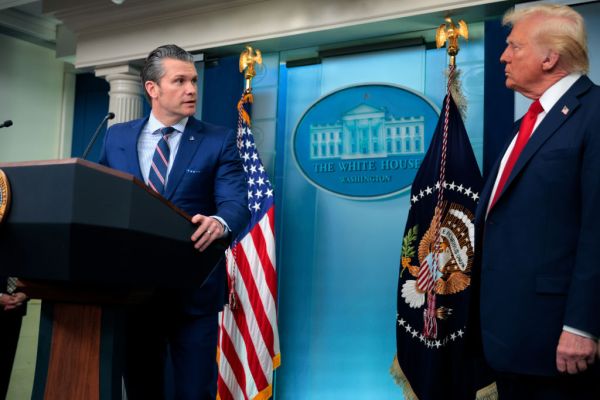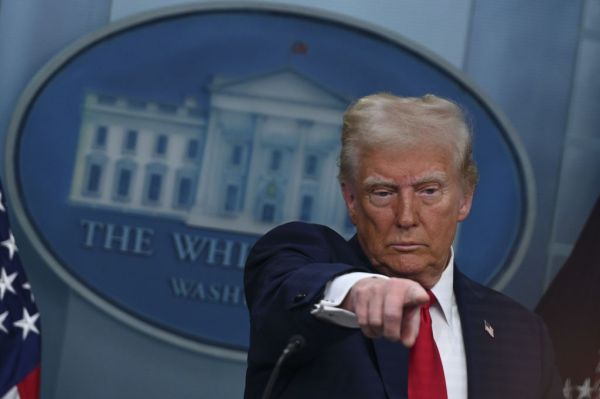The lowest form of punditry is to ask “What if the other party did it?”
It’s not that the question is unfair, it’s that hypocrisy is so plainly a fact of political life that only an amateur would think himself clever for noticing. And the further America sinks into postliberal decadence, the more amateurish it becomes.
That’s because “What if the other party did it?” is a shaming tactic and ours is a political culture that’s come to regard shame as “weak” and shameful in its own right. Imagine being a professional commentator in the year of our Lord 2025 and expecting Republicans to gaze mournfully at their shoes when you say, W-w-what if Joe Biden had pardoned hundreds of criminals who attacked Congress to assist his coup plot?
You’re not shaming them by asking that. All you’re doing is demonstrating that you don’t know what time it is.
Even so, “What if the other party did it?” has its uses as a rhetorical device. If you’re unsure what to think about one side’s novel challenge to some political norm, considering how you’d feel if the challenge had come from the other side might jar you into clarity. (That’s liberalism in a nutshell, not to mention the Golden Rule.) And so if you check social media today, you’ll find leftists asking how the right would react if Elon Musk’s ideological purge of the federal bureaucracy were instead being conducted by George Soros.
It’s a decent analogy, no? Soros too is a fabulously wealthy private citizen who’s purchased enormous influence over his party and has leveraged it toward political ends. If President Kamala Harris handed him a skeleton key to every federal agency and told him to get rid of anyone he likes, it would be an outrage. And if Soros objected to revealing the identities of his henchmen as they went about remaking the government according to his specifications, it would be downright dystopian.
“Who elected George Soros?” Fox News would demand to know. The word “coup” would be thrown around. Bleary-eyed weekend host Pete Hegseth might immolate himself in protest.
The word “coup” is also being thrown around today to describe what Musk is up to. Is that fair?
Hacking and slashing.
This is the part of the column where I explain what Elon is “up to.” The problem is … no one knows.
We know in broad strokes. The Department of Government Efficiency (DOGE) that he heads has elbowed its way into agencies ranging from the Treasury Department to the Office of Personnel Management to the U.S. Agency for International Development. Musk’s teenybopper aides apparently now have access to gigantic stores of sensitive information, including the U.S. Treasury’s paylist and OPM’s files on federal workers. Ostensibly they’re gathering and processing this data to guide their decisions on where to cut spending.
But … no one knows, just like no one knows how secure that access might be. Privacy advocates are panicked about it. “They’re not following the law, they’re not following any semblance of best practice, they’re just hacking and slashing government IT systems in a way that threatens national security and puts everyone at risk,” one told Politico. Some experts have compared DOGE’s work to a cyberattack. The New York Times reported on Monday that Musk’s allies “now aim to inject artificial intelligence tools into government systems” to assist with the agency’s work. Is that secure? Hopefully someone knows.
And all of this assumes that everyone involved is acting in America’s best interests, another thing that no one knows with certainty. It’s not clear whether all relevant DOGE personnel have been vetted for security clearances and Elon himself is famously friendly with the governments of Russia and China, as one must be to do business in those countries. If Moscow and Beijing inform him that Tesla’s access to their markets depends on him giving them surreptitious access to U.S. government databases, what will he say?
If he turns them down, what happens when one of those teenyboppers is quietly offered $5 million or whatever to provide the same access? The potential data spill here dwarfs the document-hoarding at Mar-a-Lago that brought a federal indictment down on Donald Trump’s head.
The easy answer to whether all of this amounts to a coup is “no” because, after all, Musk answers to the president of the United States. He’s acting under the president’s authority, subject to the president’s supervision. You can dislike what he’s doing but it’s not as if he’s unaccountable.
Isn’t he, though? More from the Times:
Senior White House staff members have at times also found themselves in the dark [about DOGE’s work], according to two officials, who spoke on the condition of anonymity to describe sensitive discussions. One Trump official, who was not authorized to speak publicly, said Mr. Musk was widely seen as operating with a level of autonomy that almost no one can control.
…
Several former and current senior government officials—even those who like what he is doing—expressed a sense of helplessness about how to handle Mr. Musk’s level of unaccountability. At one point after another, Trump officials have generally relented rather than try to slow him down. Some hoped Congress would choose to reassert itself.
Take it from a Never Trumper: If you’re holding your breath waiting for Congress to “reassert itself” against an immensely powerful right-wing demagogue, you’ll suffocate a thousand times over.
Several Republican senators who spoke to NOTUS confirmed they’re not planning to do a thing to confront Elon, in fact. When Sen. Rick Scott was asked why Congress has allowed DOGE to usurp its own constitutional duty to oversee administrative spending, he begged the question by replying, “It doesn’t look like Congress is doing their job.” Sen. Thom Tillis was pressed about DOGE impounding federal spending and allowed that “it runs afoul of the Constitution in the strictest sense” before quickly noting that presidents have always enjoyed a little wiggle room to ignore the laws they’ve sworn to enforce.
No one, apparently including the White House, seems to have full transparency into what Elon is doing. No one, least of all Congress, feels politically secure enough to rein in a guy with enough of a populist following in his own right to have tanked a House Republican funding bill in December. Nor does anyone have any real sense yet of how much of DOGE’s work is legal or illegal. Employment law, budget law, privacy law—the variety of statutes that the agency’s actions may already have violated is enough to fill out entire news stories.
And Musk might only be getting warmed up. “Regulations, basically, should be default gone,” he said on a public call hosted on Twitter on Monday night. “Not default there, default gone…. We’ve just got to do a wholesale, spring cleaning of regulation and get the government off the backs of everyday Americans so people can get things done.” Can he/Trump do that? What will happen if they try? Say it with me: No one knows.
Back to the original question, though. Is this a “coup”? It’s certainly not violent. The constitutional framework remains formally intact. It’s just that no one with the authority to do so seems terribly interested in enforcing that framework to constrain Elon Musk.
A little bit coup-y.
In a coup, power is usurped unlawfully and wielded without accountability. That’s what Trump sought to do when he connived to stay in office in 2020 after the electorate voted him out and told him to scram. DOGE isn’t that sort of coup, obviously—Musk still reports to Trump, nominally. But the degree of independence his outfit has achieved already from presidential and congressional oversight is remarkable. From public oversight too: Per the Times, Elon’s team has “prioritized secrecy, sharing little outside the roughly 40 people” involved, and staffers have even gone as far as to refuse to give their surnames when interviewing federal workers on the job.
We haven’t yet reached the point of Trump-Musk goons barging into agencies in balaclavas and tactical gear to secure the premises. But when you’re weighing the legitimacy of a government action, whether relevant personnel feel obliged to conceal their identities in carrying out their tasks is a point worth considering.
Another hallmark of a coup is that it takes place in a climate of intimidation. Trump’s political enemies have lived in terror of him and his populist base for most of the past 10 years, never more so during the coup attempt that led to January 6. But the episode in December in which Musk successfully incited a grassroots revolt against the House GOP’s funding bill proved that wary congressional Republicans now fear Elon’s wrath as well. And why wouldn’t they? He seems to be more popular with Republican voters than they are and literally no one on Earth is better equipped to fund primary challenges against those who cross him.
He’s also a nasty demagogue who’s getting nastier by the day, as my colleague Michael Warren demonstrated by tracking his recent interaction with Sen. Todd Young. Despite hiding the names of his own staffers, Musk is not above singling out disfavored federal employees by name to his 215 million Twitter followers knowing full well the sort of harassment that will lead to. No wonder civil servants are “fearful of speaking out [against DOGE] and uncertain of their futures and their livelihoods,” according to the Times. And no wonder that Republicans in Congress have no interest in obstructing him.
A third hallmark of coups is that they’re part of a sweeping effort to claim and concentrate power. You can and should loathe Barack Obama’s dubious assertions of “prosecutorial discretion” in affronting the law but Obama never had a two-week span that looked anything like this. Trump’s personnel purges, impoundment schemes, tariff-palooza, and cronyist pardons aren’t discrete policy decisions but part of a program. The program is to show domestic stakeholders and foreign powers that their treatment by the U.S. government will depend almost entirely on whether the president, personally, regards them as a friend or enemy.
Musk has concentrated quite a lot of power in his own right over the last four years. He is, of course, the world’s richest man, with enormous influence over the auto industry and space exploration. He owns America’s most politically influential social media platform and has successfully weaponized it against his enemies. By doing so he’s gained a huge base of popular support on the activist right that’s exceeded at this point only by Trump’s. And now, by dint of his DOGE remit, he’s insinuated himself into the inner workings of the federal bureaucracy.
With apologies to William Randolph Hearst, he’s probably the most powerful private citizen in the history of the United States. That being so, handing him the keys to the government and telling him to go nuts does feel a little coup-y, no?
The last hallmark of a coup is the subduing its rivals for power. If you doubt that the majority party in Congress has been fully neutered, consider that Tulsi Gabbard and Robert F. Kennedy Jr. both sailed through their committee confirmation votes on Tuesday morning despite the fact that this was an ideal chance for Senate Republicans to draw a red line for Trump and Musk. We won’t confirm another nominee until Elon and DOGE submit to real accountability. They could have said that. They didn’t. The president has broken the legislature’s will to check the executive branch.
Eventually, perhaps, a federal judge will step in and finally tell Elon “no.” But if you’re expecting a pair of civic wrecking balls like him and Trump to meekly obey that ruling, you’re expecting a lot. Even if they do, the judiciary moves at a crawl. Thousands of federal employees may have been purged and unknown amounts of sensitive data seized before the courts get around to this. “The infrastructure of dictatorship,” as Kevin Williamson called it, will go on being built in the meantime.
That’s Musk’s great advantage, as Mike Warren pointed out. He’s following the Facebook maxim of “move fast and break things” to upend a sluggish system before it can react effectively. Even if someone finally slows him down or stops him, how do they un-break what he’s broken?
The infrastructure of dictatorship.
“Move fast and break things” is a Jacobin attitude and the antithesis of G.K. Chesterton’s parable of the fence, a lesson whose wisdom any traditional conservative (any intelligent person, really) cherishes.
Before you knock down a fence, Chesterton wrote, make sure you understand why it was put there in the first place. Musk’s approach to management is the opposite, TechDirt’s Mike Masnick explained last week. His oversight of DOGE resembles his oversight of Twitter in that both demonstrate “his authoritarian impulse to (sometimes literally) demolish systems without understanding them, and his tendency to replace existing, nuanced solutions with far worse alternatives (even when those older systems probably did require some level of reform).”
Moving fast and breaking things in the federal bureaucracy could actually lead to less efficiency in some cases, not more. A Biden administration veteran warned The Atlantic’s Charlie Warzel that “even simple-sounding procedures—allocating government funds in a crisis like, say, a pandemic—require coordination among teams of civil servants across multiple government offices.” If you’re pulling Jenga pieces carefully and deliberately out of a teetering tower, you might successfully streamline the structure while keeping it upright. If you’re pulling them out willy nilly to show how bold and alpha you are (“Regulations, basically, should be default gone”), uh oh.
Before you knock down a fence, make sure you understand why it was put there in the first place. Elon’s response to that, in so many words, is “no fences.”
In theory, as Kevin said at the end of his column today, all of this will come back to haunt the GOP. “Everything Trump does via executive order is subject to being undone in the same way, in five minutes, by the first successor with different preferences,” he wrote. “But do you think his successor, having a new appreciation for what is possible in our rickety system, is going to stop there?” Again, that’s liberalism in a nutshell: The rules you set today are the rules your opponent will use against you tomorrow. A member of the Soros family leading DOGE in 2029 is a live possibility.
But for that to happen, we need to believe that Trump’s administration would make way for victorious Democrats. I don’t believe that, and not just because I’m an incorrigible pessimist.
The postliberal project on which Trump and Musk are embarked to install “the infrastructure of dictatorship” will require them to try to cling to power over voters’ objections. No authoritarian movement would go to the trouble of building a mechanism to purge its opponents from the government, use it ruthlessly and unaccountably, and then graciously hand over control of it to its victims after losing an election. Having raised the stakes of presidential power significantly by arming the executive with tools to persecute his opponents, why wouldn’t Trump and his political heirs insist that those stakes are now sufficiently high that power must be retained at all costs?
This is what Republican primary voters doomed us to last year. By renominating a post-insurrection “retribution”-minded authoritarian, they assured Americans of at least one more coup attempt a la 2020. Had Trump lost in November, that attempt would have happened this winter; as it is, because he won and gained the opportunity to concentrate federal power to serve right-wing interests, it’ll happen the next time American voters try to throw the GOP out.
And when it does, and rank-and-file Republicans are asked to choose between moving fast and breaking the Constitution or heeding Chesterton, there’s not an ounce of doubt what they’ll do.







Please note that we at The Dispatch hold ourselves, our work, and our commenters to a higher standard than other places on the internet. We welcome comments that foster genuine debate or discussion—including comments critical of us or our work—but responses that include ad hominem attacks on fellow Dispatch members or are intended to stoke fear and anger may be moderated.
With your membership, you only have the ability to comment on The Morning Dispatch articles. Consider upgrading to join the conversation everywhere.